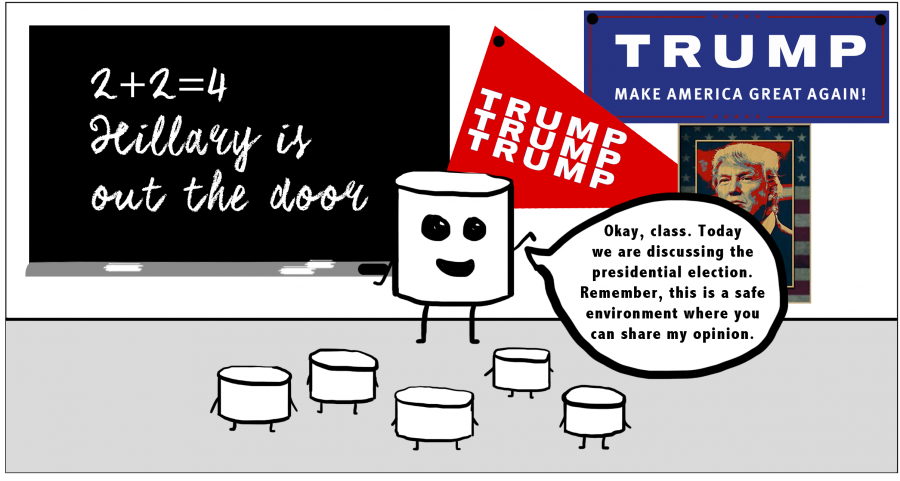Unless directly related to subject, politics should be left out of classrooms
March 4, 2017
“Isn’t the sun shining brighter today?”
These were the words of a teacher at Central after Donald Trump was elected president.
“If the president can say p*ssy, I can say it in the classroom.”
These are the words of another teacher at Central after President Trump’s now-infamous comment.
Since the beginning of this school year, our editorial board has noticed an uptick in political discourse from both peers and teachers. These comments have ranged from rants to jokes to lessons.
While our editorial board recognizes the benefits of politics in a social studies classroom, we all agree that the two aforementioned comments are completely out of line and wrong. Teachers should not be using their influence as adults and role models to assault kids’ political beliefs. This is, frankly, an abuse of power.
High school is a time for people to find themselves. We enter at 14, still cringing from the eternal awkwardness of junior high. Most of us don’t know our political affiliations. And even if we do, it’s most likely just our parents’ words coming out of our mouths.
At this stage, it is more important than ever to have unbiased teachers. We are exploring ourselves and our opinions, and we need to have support from our teachers on this quest. If we are inhibited by one teacher’s hatred of Obama or Trump, our search for identity becomes compromised.
Now this begs the question: how should teachers act in the classroom?
Well, first of all, they should keep opinions at home. If a doctor walked into a meeting and went off on a political rant about the environment, his colleagues would not tolerate it. The same should go for teachers.
In fact, that political rant doesn’t even relate to the doctor’s job. Applying these standards to teachers, every department except social studies and certain English classes should steer clear from politics. There is no educational application of politics to precalculus, so it shouldn’t be brought up.
However, in social science classes, the door opens. In government classes, for example, discussion of the government is not only logical, but also necessary. It would not be educationally sound to ignore new political movements in a government class because the class is literally a place where this is designated to be discussed. In a history class, a historical lens can be applied to current events to either help explain them or understand what brought them about. Even in an anthropology or sociology class, current events can be discussed under an emotional/behavioral lens.
These classes fit within the boundaries of political discourse. Everything else is out of bounds.
Yet, if students are going to have a productive discussion about politics in class, teachers need to provide a safe place to ask questions and discuss. There are two steps to doing this.
First, teachers must first be educated. They must take extra time to fully grasp both sides of an issue so they are able to soundly answer students’ questions. This may require extra reading or paying attention to news, but it is a necessary step in order to best support students.
Second, teachers must argue both sides of issues. If a teacher only gets news from liberal or conservative leaning sources, their answers will be biased and they will damage a student’s search for self.
Additionally, if a teacher frequently presents only his or her side of an issue in the classroom, students of the other opinion will no longer feel respected or safe to ask questions. Kids can have disagreements or debate between themselves, but a teacher’s role is an educator. They need to exercise that role.
We know teachers aren’t perfect and political leanings always come out. As long as these views do not directly affect the teacher’s respected rights of a student (for example, if a teacher is homophobic), these opinions are not necessarily always bad because they provide a wider world view for dissenting students.
So, yes, while we think that teachers should keep their own politics out of classrooms, an occasional slip up is not the end of the world, as long as the teacher has established a culture of respect and tolerance in his or her classroom.
Overall, teachers need to see their classrooms as safe places for learning and discussing controversial issues, not a place to rant about personal beliefs.







